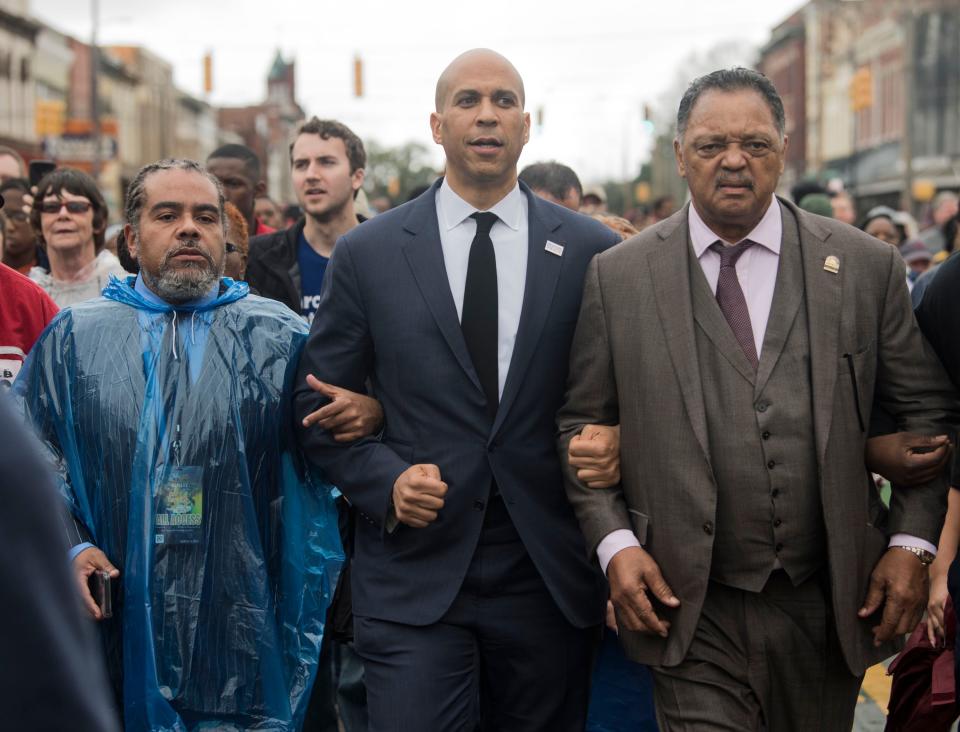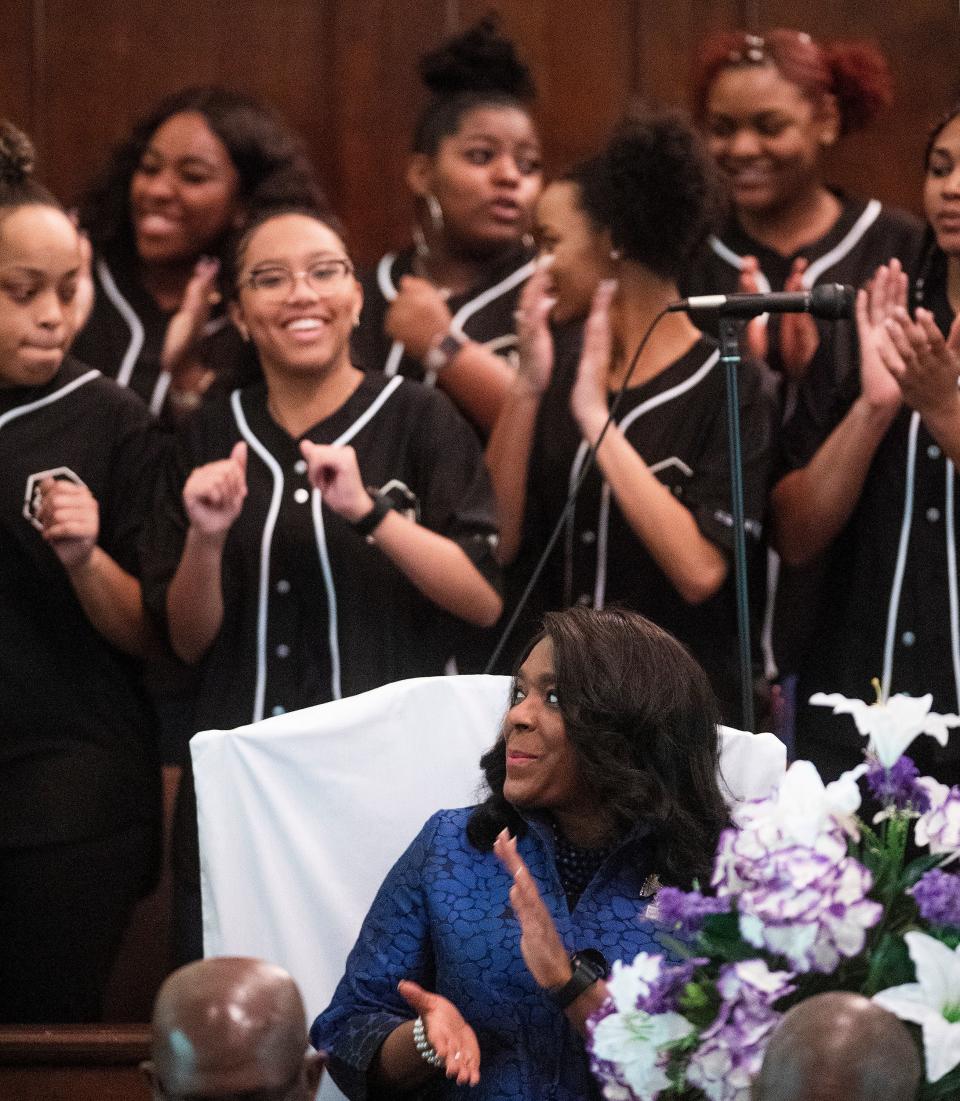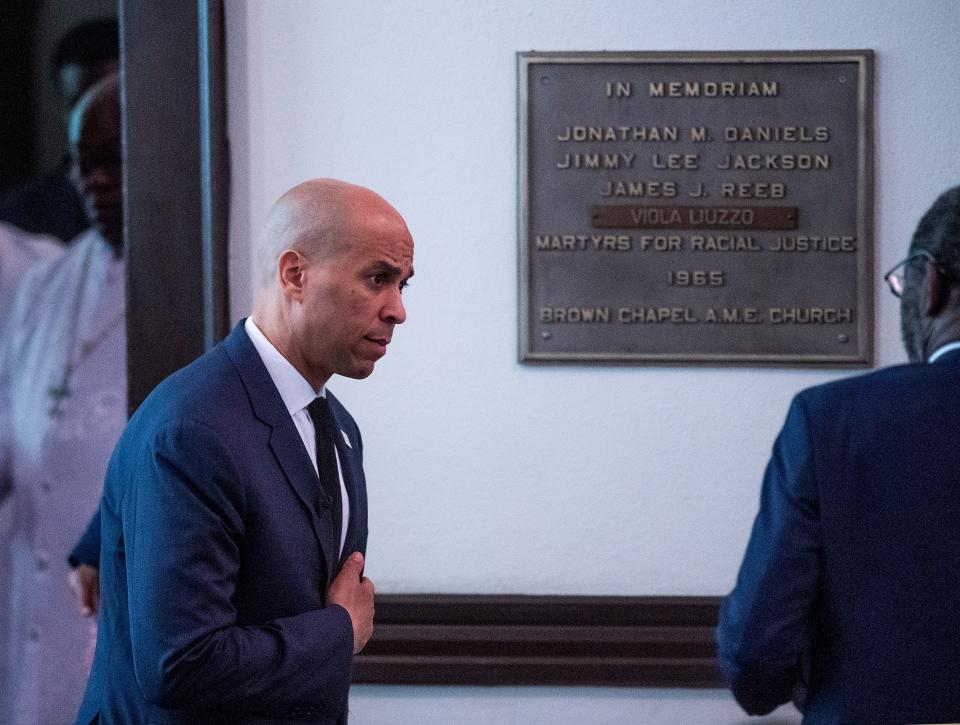After 54 years, the fight for voting rights in Selma is ongoing, organizers say

SELMA, Ala. - Fifty-four years after the brutal beating of black civil rights protesters in Alabama catalyzed the passage of sweeping voting rights legislation, politicians and civic leaders gathered in a Selma church on Sunday morning and once again decried the state of voting rights in America.
The annual church service in Selma's Brown Chapel AME's sanctuary was as much a commemoration of the historical Bloody Sunday march as it was a clarion call for looming Democratic legislative and political battles.
"We can't indulge in a moral amnesia and forget that you honor history not just by reciting it, but by emulating it," said U.S. Sen. and Democratic presidential candidate Cory Booker of New Jersey. "Let it challenge you, demand from you. We come together to honor the sacrifices today. The only way we can honor the work done before us is by recommitting ourselves to it."
More: Is voter suppression happening in Georgia? Just ask disenfranchised voters: Today's talker
Last week, Rep. Terri Sewell, D-Ala., introduced a bill seeking to restore key provisions in the Voting Rights Act of 1965 — the legislation that was sparked when hundreds of civil rights protesters attempted to march from Selma to Montgomery on March 7, 1965. The non-violent marchers were met with clubs and tear gas from white law enforcement in a brutal clash that shocked the nation.

But a Supreme Court decision in 2013, Shelby County v. Holder, rendered much of the Voting Rights Act ineffective. Sewell's Voting Rights Advancement Act seeks to patch the hole the Holder decision left, where states with a documented history of discrimination were previously required to "preclear" any election law changes with the Justice Department.
Sewell, along with many others gathered in Selma on Sunday, said reestablishing preclearances would discourage forms of voter suppression cropping up across the country.
More: With no polling place in this town, Latinos still vote despite voter suppression concerns
"Our work is not done," Sewell said. "We love to say that we stand on the shoulders of greatness, and we do. ...But we all have our work to do. I know my marching orders because I know from by whence I come," Sewell, a Selma native, said. "My marching orders are to restore the full protections of the Voting Rights Act of 1965."
Former Secretary of State and presidential candidate Hillary Clinton, who was honored with the International Unity Award at the Martin Luther King and Coretta Scott King Unity Breakfast Sunday, echoed Sewell's call at Brown Chapel, calling the Holder decision "absurd." Clinton said it's impossible to tackle other economic or social issues without first protecting the right to vote.
"Don't just come to Selma once a year," said Clinton. "Don't just walk across the bridge. Don't just join hands and sing. We've got to get to work. That means registering each person and persuading them that their future depends on them showing up to vote."
Thunder resounded through Brown Chapel's stained glass windows and tornado sirens trilled through Booker's keynote address. Booker, raised in the AME church, made as much of a sermon as he did a stump speech. Drawing heavily on the biblical story of Joseph, Booker spoke of Genesis 37:19, which depicts the moment Joseph's brothers, resentful of his ambitions, plot his death.
Booker drew comparisons between the scripture and Jimmie Lee Jackson, the Selma civil rights activist and church deacon who was shot to death by an Alabama state trooper while trying to defend his mother and grandfather. Jackson's death "sparked the ignition point" for the Selma to Montgomery marches, Booker said.

"... We are called to love each other. To revive civic grace. Patriotism is love of country, and you cannot love your country unless you love your fellow country men and women. The spiritual cords that tie us together are stronger than the lines that divide us."
Despite the threat of severe weather, hundreds attended the commemorative walk over the iconic bridge.
A longtime attendee, Sheryl Threadgill-Matthews, brought with her young people from the 21st Century Youth Leadership Movement. Threadgill-Matthews, of Camden, said it's important for the older generations to educate the younger, as they will have to pass the baton of the civil rights movement on.
"I want to be a model for them," she said. "We hope they will take up the mantle."
More: Alabama tornado kills at least 23, workers searching for missing people
Rain-soaked Selma felt as much a political proving ground as civic tradition, as national presidential campaigns begin a 2020 push ahead of the Democratic primaries where Deep South states like Alabama can play a major role. Sen. Bernie Sanders, I-Vt., joined Booker in town, while the potential candidate and Ohio Sen. Sherrod Brown attended the Brown Chapel church service.
But the annual pilgrimage is meeting a different city than the Selma of decades' past. As speeches wrapped outside of the chapel, a local man, frustrated with what he believed to be a delay in the march, asked why locals had to wait on politicians to begin their local tradition. Sunday's march inched by empty storefronts: The city's population has plummeted by more than 11 percent in less than a decade, according to U.S. Census data, as industry has left the area and the city struggles to meet payroll. At $24,223, the city's median income is nearly half of Alabama's median and significantly below the U.S. median at $59,039.
"There were some people who felt understandably frustrated that everybody comes down for this march and doesn't give enough attention to the persistent poverty that is here, the gun violence that is here, the need for infrastructure investment," Booker said in an interview with the Montgomery Advertiser before the march.
"I'm somebody who doesn't want to just come down here to recognize our history," said Booker, whose maternal grandmother hailed from Dora, Alabama. "I want to come down here to make a better future for Selma, for Alabama."
Follow Melissa Brown on Twitter: @itsmelissabrown
This article originally appeared on Montgomery Advertiser: After 54 years, the fight for voting rights in Selma is ongoing, organizers say

